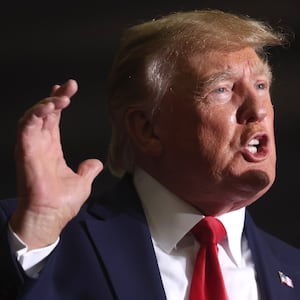No Republican politician has more aggressively stood up to Donald Trump and his assault on American democracy than Rep. Liz Cheney. She has refused to embrace Trump’s “Big Lie” about the 2020 election and has repeatedly warned about Trump’s pernicious efforts to, in her words, “unravel our constitutional republic.”
Last night, she received her “reward”—a drubbing in her fight for renomination and the likely end of her political career.
Cheney’s defeat Tuesday, in a state that once revered the “Cheney” name, comes as little surprise. Once she turned her back on Trump or, more accurately, refused to bend her knee to the former president, the handwriting was on the wall.
Of the nine other Republicans who joined Cheney in voting for articles of impeachment against Trump in January 2021, only two remain. Four retired and three others lost in primaries to Trump-backed opponents.
But none of the 10 heretics were more prominent and forceful in their denunciations of Trump than Cheney. In January 2021, she was the third-ranking member of the House Republican leadership—and a rising star in the party. But her apostasy was too much for House Republicans, who voted to remove and replace her with New York Rep. Elise Stefanik—a former Never Trumper more loyal to her ambition than her principles.
Cheney’s downfall is bigger than just the defeat of one politician; it is emblematic of the Republican Party’s descent into cultism.
Like Stefanik, Cheney’s opponent, Harriet Hageman, followed a similar downward trajectory into the political sewer. In 2016, she correctly derided Trump as a “racist and xenophobic” and tried to engineer a vote on the floor of the Republican National Convention to replace Trump on the national ticket with Texas Sen. Ted Cruz. Today, Hageman calls Trump “the greatest president of our lifetime,” a claim so ludicrous only the clueless or the craven would make it.
It is, of course, a deeply cynical switcheroo, but one that is no longer surprising.
Republicans with political aspirations know they must kowtow to Trump if they want to win a Republican primary or keep their job in a red state. Hageman is no different from South Carolina Sen. Lindsey Graham, who in 2016 said that embracing Trump would mean “losing the heart and soul of the conservative movement.” She has followed the same path as Florida Sen. Marco Rubio, who also in 2016 called Trump a “con man” and too “dangerous” to have control of the country’s nuclear codes. Today, of course, Rubio has been one of Trump’s loudest defenders since the FBI search of his Mar-a-Lago residence last week.
Indeed, truth be told, it’s a similar course to the one followed by Cheney. In 2016, after the publication of the so-called Access Hollywood tape, she maintained her support for Trump. While she said Trump’s comments were “appalling,” Clinton was, in her words, a “felon” and Cheney said there was “no question that Donald Trump would be far better for Wyoming than Hillary Clinton.”
She defended Trump during his first impeachment in 2019, calling the congressional inquiry a “sham” and a waste of time. Unlike her fellow GOP apostate, Rep. Adam Kinzinger, she has expressed no regrets over her “no” vote on that impeachment.
But, Cheney eventually came to her senses about Trump and the malign influence of Trumpism on her party and the country as a whole. While one can criticize her previous support for Trump as a cynical, political decision, it must be accompanied by the acknowledgment that in voicing her criticism of Trump today—so loudly and so persistently—she was not blind to the political consequences. It would likely end her political career, and she knew it. Yesterday, that’s precisely what happened.
In recent weeks, there’s been talk that the soon-to-be former congresswoman may challenge Trump in the 2024 Republican primaries. Good luck with all that.
When she asked her fellow Republicans in receiving the 2022 Profile In Courage Award by the John F. Kennedy Library, “Will we do our duty, will we defend our Constitution, will we stand for truth, will we put duty to our oath above partisan politics or will we look away from danger, ignore the threat, embrace the lies and enable the liar?” the implicit answer that came back has been resounding and overwhelming.
There is no constituency in the modern Republican Party for Cheney’s principled conservatism and her allegiance to basic and universal American political traditions. She would garner little support in Republican presidential primaries. If she ran as an independent, her unapologetic conservatism would allow few Democrats to cast a vote for her. She is today a politician without a political home.
Yet, one doesn’t have to agree with Cheney’s politics (and I certainly don’t) to acknowledge that her willingness to criticize, investigate, and expose Donald Trump’s Big Lie about the 2020 election is the kind of courage worthy of applause. Rather than engaging in the cynical and craven political machinations of her fellow Republicans, Cheney has, with steadfast adherence to principle and clear eyes, torpedoed her political aspirations. She is a unicorn in the modern GOP—one who is willing to tell the truth about Donald Trump
Cheney might be an imperfect hero, but she is a hero, nonetheless, and the country is poorer for her defeat.








